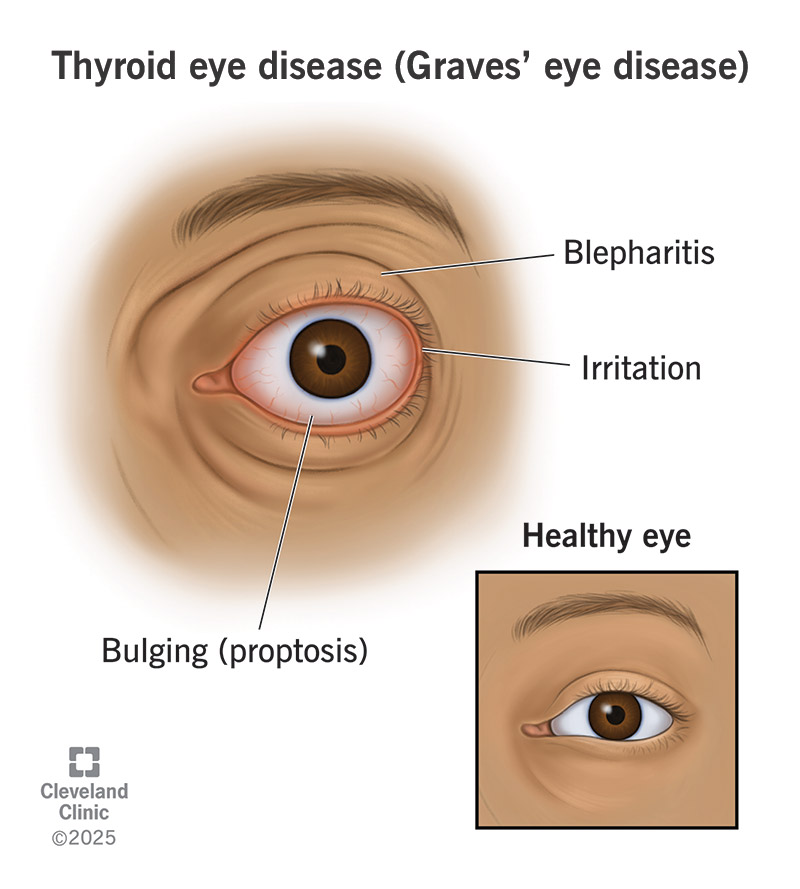Certain types of thyroid disease can affect the tissues around your eyes, causing inflammation, swelling and pain. This is called thyroid eye disease (Graves’ eye disease). Most cases are mild. But severe cases can interfere with your eye muscles and eyelids, preventing your eyes from moving and closing properly. This can cause a variety of problems for your eyes. You may need a combination of therapies to treat it.
Advertisement
Cleveland Clinic is a non-profit academic medical center. Advertising on our site helps support our mission. We do not endorse non-Cleveland Clinic products or services. Policy

Image content: This image is available to view online.
View image online (https://my.clevelandclinic.org/-/scassets/images/org/health/articles/thyroid-eye-disease)
Thyroid eye disease (TED) is an inflammatory disorder that affects the tissues around your eyes, causing swelling, discomfort and other symptoms. It happens in some people who have autoimmune diseases that attack their thyroid gland. Most often, it happens in people who have Graves’ disease. In this case, your healthcare provider may call it Graves’ eye disease.
Advertisement
Cleveland Clinic is a non-profit academic medical center. Advertising on our site helps support our mission. We do not endorse non-Cleveland Clinic products or services. Policy
Although autoimmune diseases are lifelong, TED has distinct phases. It may be active for two years or more before the inflammation subsides. During this time, symptoms may come and go and may be mild to severe. TED is mild for most people. But when it’s severe, it can cause permanent damage, with lasting cosmetic and vision changes.
Ophthalmopathy and orbitopathy are two other terms for eye disease. Your healthcare provider may describe TED as:
Typical thyroid ophthalmopathy symptoms include:
Symptoms normally affect both eyes, but sometimes, you may only notice symptoms in one eye.
Appearance and vision changes that occur with thyroid eye disease may improve after the active phase is over, but they don’t always. Scarring can prevent the tissues around your eyes from healing and returning to their normal shape. Sometimes, parts of your eyes that affect your vision are permanently damaged. Surgery can treat some of these effects.
Advertisement
Lasting appearance changes may include:
Lasting vision changes may include:
Thyroid eye disease is an autoimmune disease. This means your immune system attacks your thyroid and eye tissues. Graves’ disease is a common cause, but other autoimmune thyroid diseases, like Hashimoto’s disease, can also cause it. Even people with normal thyroid function can develop TED.
In these diseases, your immune system creates antibodies that mimic thyroid hormones and attach to thyroid hormone receptors. These receptors are mostly within your thyroid itself, but some are in the tissues behind your eyes. So, the same antibodies that affect your thyroid can also affect your eyes.
You may be more likely to get thyroid eye disease (Graves’ eye disease) if you:
A healthcare provider will be able to diagnose thyroid eye disease by doing a physical eye exam. They’ll be able to examine both your eyelids and your eyes.
If your healthcare provider thinks that you have thyroid eye disease, they’ll order blood tests to check if your thyroid hormone levels and antibodies are too high or too low.
Other tests your provider may request include:
The treatment you’ll need will depend on what stage the disease is in and how severe it is. Supportive treatments can help ease your symptoms while thyroid eye disease is active. These might include home remedies, over-the-counter or prescription medications. After the active phase has ended, you might need or want cosmetic surgery or vision correction surgery.
Supportive treatments for thyroid eye disease may include:
Advertisement
Your healthcare team can offer alternative treatments if these don’t work for you. Rarely, some people may need surgery during the active phase of Graves’ eye disease. But in most cases, you and your team will consider surgery after your condition has stabilized. At this point, it’ll be easier to tell which appearance and vision changes are likely to be permanent.
Surgery for thyroid eye disease may include:
Advertisement
The outlook is good for most people with thyroid eye disease. Most have mild symptoms, which often resolve on their own. People over the age of 50 tend to have more severe symptoms. If you have a serious case of TED, you might need a combination of treatments to manage it. Some people have lasting changes to their eyes, which may require surgery.
When you have thyroid eye disease, it’s important to let your healthcare team know if your symptoms worsen. You should also let them know if you notice any changes in your vision. Some changes might need urgent treatment. Call right away if you notice:
Thyroid eye disease (Graves’ eye disease) can have a real impact on your quality of life. While most people won’t have severe symptoms, it can be very distressing if you do. Inflammation around your eyes can affect your comfort and vision as well as your appearance.
It takes a team of healthcare providers to address all these factors. Support in your personal life can help a lot, too. If you don’t have the support you need, reach out to your healthcare team. They can offer resources to support your emotional well-being.
Advertisement
Learn more about the Health Library and our editorial process.
Cleveland Clinic's health articles are based on evidence-backed information and review by medical professionals to ensure accuracy, reliability, and up-to-date clinical standards.
Cleveland Clinic's health articles are based on evidence-backed information and review by medical professionals to ensure accuracy, reliability, and up-to-date clinical standards.
Cleveland Clinic’s ophthalmologists and optometrists have the highest training available. We provide exams, vision correction and care for many eye conditions.
